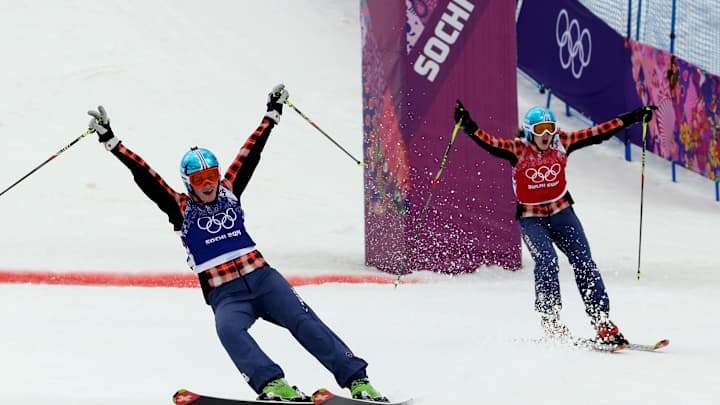Canada finishes 1-2 in Olympic women's skicross

KRASNAYA POLYANA, Russia (AP) Marielle Thompson and Kelsey Serwa got great air even with their ski boots on, kicking back their heels and flailing their arms so wide, they almost dropped the flowers.
That, Canada, is what you call owning the podium.
The Canadian women won gold and silver in skicross Friday, giving their country bookend 1-2 performances in the freestyle skiing events at the Sochi Olympics.
Freestyle opened Feb. 8 with sisters Justine and Chloe Dufour-Lapointe of Montreal finishing first and second in moguls.
''Being on the podium at the Olympics in itself is pretty cool,'' Serwa said, still all smiles long after a jubilant celebration during the flower ceremony. ''To be standing beside your teammate is the best feeling in the world.''
In all, the Canadians have sent two people to the freestyle podium four times during these games: men's and women's moguls, women's slopestyle and women's skicross. They also had the men's silver medalist on the halfpipe.
In all, that's nine freestyle medals for the country that pumped upward of $110 million into their ''Own The Podium'' program in advance of the Vancouver Games, hoping to boost the medal count and seed some potential in the raft of action sports added to the Olympics.
''It's been a huge force all the way through,'' Serwa said. ''Heading out there and being able to train around the world all year-round - without that, we wouldn't be here today.''
The Canadians dedicated this final freestyle victory to Nik Zoricic, the skicross racer from Toronto who died in a race in Switzerland in 2012.
Zoricic wore blue jeans to training in the early days because he didn't have the right kind of snow pants. The Canadian team, normally awash in red and white, went with blue bottoms to honor their fallen friend.
''I'm sure Nik is up there smiling and cracking open a couple of beers and we miss him,'' Canadian coach Eric Archer said.
Zoricic died only two months after Canada's most famous freestyle star, Sarah Burke, lost her life from injuries suffered in a training accident on the halfpipe.
If anyone needed reminding about the dangers of these extreme sports, women's skicross was Exhibit A.
The final on a foggy, drizzly day at Rosa Khutor served up its share of ugly accidents that could ignite discussion about whether the Olympic course is built too big for the women.
In back-to-back quarterfinals, Anna Woerner of Germany and Stephanie Joffroy of Chile were taken off the course on stretchers after wrecking despite not being bunched in a tight racing pack. Woerner broke her right shin and tore a knee ligament. No updates on Joffroy's condition were immediately provided.
The dangers of this sport were amplified last weekend when Russian skicross racer Maria Komissarova fractured her spine in training. She had emergency surgery at a hospital in the mountains and was later taken to Munich, Germany, for another operation.
''It's always sad when people get injured and, of course, I hope they get well fast,'' said Anna Holmlund of Sweden, who won the bronze medal. ''But in one way, it's the Olympics and it's supposed to be tough. I think it's a good course.''
Regardless, skicross is not for the faint of heart.
The injury section of Serwa's official Olympic bio reads like a human anatomy exam: back, thumb and rib injuries in 2011; ruptured knee ligament after getting caught up in another skier's pole in 2012; re-tore the knee ligament last March. And that's just the bad stuff.
Serwa advanced to the medal race after rallying from fourth to second over the last 100 meters or so of her semifinal. She picked through some danger and outraced Switzerland's Fanny Smith to the line.
''As much a mental as a physical battle,'' Serwa called skicross, with all its injuries and momentum changes.
Thompson, meanwhile, essentially breezed through her day.
She was ahead through almost the entirety of every race she ran. Now, Whistler, British Columbia has brought home back-to-back golds in this event. Thompson's goes alongside the one Ashleigh McIvor won in 2010. McIvor retired in 2012.
''I got to watch Ashleigh win while I was on my couch,'' Thompson said. ''I saw her win and I was like, `Wow, I can do this, too.'''
This marked Thompson's third and biggest victory of the season, and the gold medal will look good next to the crystal globe she won in 2012 as the World Cup champion.
The 21-year-old followed the path of so many skicross racers. She was an Alpine skier who first tried the more rough-and-tumble version of her sport when she was 16 and ''had a blast.''
''I started doing skicross because I loved it,'' she said. ''It's the most fun you can have on skis.''
And as she showed on the podium, sometimes the real fun starts after the skis come off.
